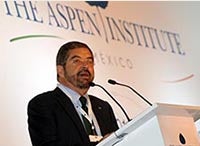Like many countries, Mexico is currently experiencing an economic slowdown; its currency fell by 13.1 percent last year. But over the past two years, Mexico has passed nearly a dozen structural reforms to increase productivity and economic development. These reforms are the next steps in boosting Mexico’s economy since former US President Bill Clinton ratified the North American Free Trade Agreement (NAFTA) in 1993 and provided Mexico with a $20 billion emergency loan in 1995.
Last week, as part of an Aspen Institute Mexico co-convened event, Clinton visited the country and spoke on a panel at the Laureate Summit on Youth & Productivity in Mexico about making the reforms a reality. The event, also co-convened by Laureate International Universities and the Inter-American Development Bank, featured speakers such as Laureate Education, Inc. Founder, Chairman, and CEO, Douglas Becker, and Inter-American Development Bank President Luis Alberto Moreno. Aspen Institute Mexico President Dr. Juan Ramón de la Fuente moderated the event.
According to Clinton, the way for Mexico to increase productivity and social mobility is to look at other countries like Germany as an example. Germany currently has the highest percent of GDP in both exports and manufacturing, “because they have very good apprenticeship programs where the employers of all sizes work very closely with education and training institutes and because the universities try to both promote academic advancement and practical knowledge and employability,” Clinton said.
By having universities and employers work closely together, Clinton believes that communities can see significant increases in job placement, income growth, and social mobility.
Additionally, Clinton emphasized how increased productivity and job placement can stem from distance education (i.e., learning via the internet).
“All the barriers that used to keep us apart, mentally and physically, now look a lot more like nets than walls,” Clinton said. “And because Mexico has made this commitment to education… both public and private… I think there ought to be a plan not only to extend [education] in this state, where you can physically reach everybody, but throughout the country.”
However, Clinton also notes that there must be a balance between distance education and outreach efforts that physically reach local communities.
“There are a lot of these young people all over Mexico who live in small towns or rural areas,” he said. “And they’re smart and gifted, and they will get whatever they can get online and they’ll come to Mexico City or some other city and start their way up the ladder. They’ll do fine.
If you want, however, to have more balanced growth and you think it would be more manageable to not have everybody living in the city, then you have to have some outreach to where people are…”

